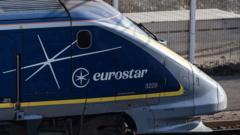Are Eurostar Passengers Facing Delays and Cancellations Because of French Rail Problems?

Understanding the Recent Eurostar Train Disruptions: Causes and Effects
Traveling by train offers a unique experience, especially when traversing the picturesque landscapes of Europe via services like Eurostar. However, recent events have shown that even the most reliable transport systems can face unforeseen challenges. Recently, passengers on Eurostar trains have been dealing with significant delays and cancellations due to a power supply issue on a rail line in northern France. This disruption not only affects travelers but also highlights the vulnerabilities inherent in rail systems. In this article, we'll delve into the details of the disruptions, their cause, the impact on passengers, and what travelers can do in such situations.
What Happened?
On a Monday morning, the Eurostar service experienced substantial disruptions starting around 08:30 local time (06:30 GMT). A power supply issue on the high-speed rail line between Moussy and Longueil in the Hauts-de-France region led to the closure of critical tracks, impacting multiple services. As a result, Eurostar canceled at least nine trains between London and Paris, with an additional fifteen services delayed. The situation was exacerbated by the need to divert trains to slower lines, further extending travel times.
Impact on Passengers
Traveling during peak seasons, such as August when many families are on holiday, can be particularly hectic. The recent disruptions have caused considerable inconvenience for countless passengers who were either heading to business meetings or enjoying summer vacations. Eurostar has advised travelers to postpone their journeys if possible, emphasizing that delays could last between one and five hours. This level of disruption is not uncommon during busy travel periods, but it certainly tests the patience of even the most seasoned travelers.
Broader Implications for Train Services
The recent disruptions also affected services beyond Eurostar. Trains running between Brussels and Paris, as well as Amsterdam and Paris, faced cancellations and delays due to the same power supply issue. This illustrates a broader vulnerability within the European rail network, where disruptions in one region can have cascading effects across multiple services and countries. Such instances remind travelers of the interconnected nature of rail services in Europe.
Understanding the Cause of the Disruption
The power supply issue reported by SNCF, the operator of the affected line, necessitated "major repairs." While specific details regarding the nature of these repairs have not been disclosed, they underscore the importance of maintaining infrastructure to prevent future disruptions. Rail systems are complex and rely heavily on consistent power supplies, signaling systems, and track integrity. Any failure in these areas can lead to significant operational challenges.
Historical Context of Rail Disruptions
This incident is not an isolated case. Just a month prior, a Eurostar train traveling between Brussels and London had to be evacuated due to a power failure in northern France. Additionally, earlier this year, two days of major disruptions occurred following separate fatal incidents on France's LGV Nord line, compounded by issues such as cable theft. These recurring problems highlight the ongoing challenges that rail operators face in maintaining safety and reliability.
Travel Tips During Rail Disruptions
When faced with travel disruptions, staying informed and flexible can make a significant difference. Here are some tips for passengers to consider:
- Check for Updates: Regularly check the Eurostar website or app for the latest information on your train's status.
- Consider Alternative Routes: If your journey is significantly delayed, look into alternative routes or modes of transport.
- Be Prepared for Delays: Bring snacks, water, and entertainment to ease the wait.
- Stay Calm: Remember that disruptions can happen. Keeping a cool head can help you navigate the situation more effectively.
Conclusion: Navigating the Challenges of Train Travel
While the recent Eurostar disruptions have caused significant inconvenience for many travelers, they also serve as a reminder of the complexities involved in modern rail travel. As infrastructure ages and demand increases, rail operators must invest in maintenance and upgrades to minimize future disruptions. For travelers, being informed and prepared is key to navigating these challenges. As we continue to rely on rail services for cross-Channel travel, understanding these dynamics will help us manage expectations and enhance our travel experiences.
Frequently Asked Questions
What should I do if my Eurostar train is canceled?
If your Eurostar train is canceled, the first step is to check the Eurostar website or app for updates. If possible, consider postponing your journey or looking for alternative routes. Eurostar also offers the option to rebook your ticket for a later date.
How can I stay updated on train delays?
The best way to stay updated on train delays is to regularly check the Eurostar website or download their mobile app. Social media channels may also provide real-time updates.
Are train delays common during peak travel seasons?
Yes, train delays can be more common during peak travel seasons like summer and holidays due to the higher volume of passengers and potential infrastructure strain. It is advisable to plan ahead and allow extra time for travel during these periods.
As travelers, how can we better prepare for unforeseen travel disruptions in the future? #Eurostar #TravelTips #TrainTravel
Published: 2025-08-04 16:21:04 | Category: technology



